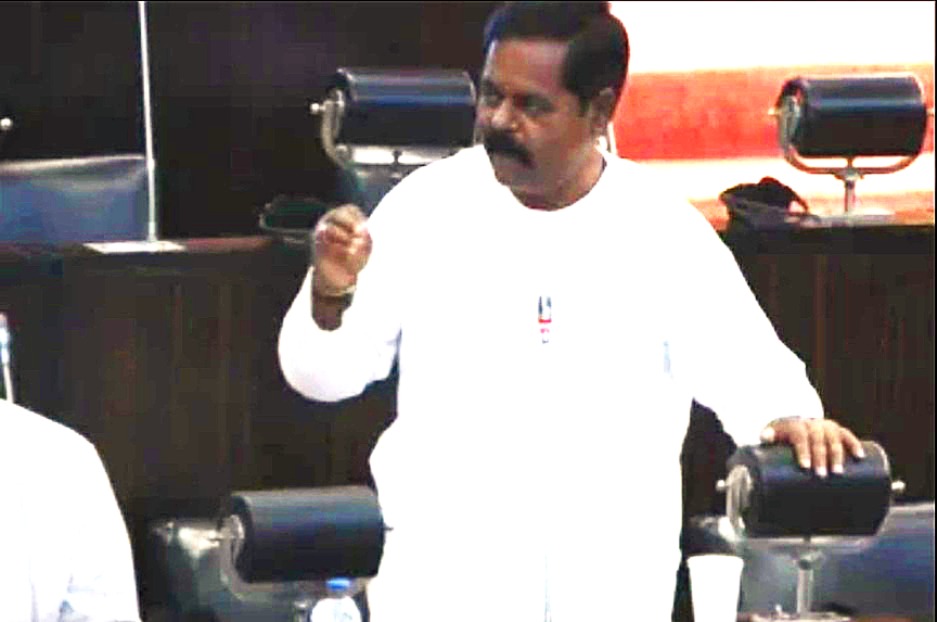“Those who once opposed solution plans are now in a position to provide solutions” – MP S. Sritharan
24-Aug-2025.

As the government is about to complete one year in office, the question arises: why has it not taken any steps to resolve the 80-year-long ethnic problem? President Anura Kumara Dissanayake has delivered special speeches in Parliament seven times, yet he has not explicitly mentioned any strategy or initial measures to resolve the long-standing ethnic issue in the country.
The current President must not act like the rulers of the past. It was the Janatha Vimukthi Peramuna (JVP) that opposed past solution proposals. Ironically, those who opposed them are now in a position to provide solutions.
Therefore, please announce concrete measures publicly. We are ready for a negotiated solution, stressed Jaffna District MP S. Sritharan of the Tamil National Alliance during the debate.
He was speaking during the special adjournment motion on human rights issues faced by Tamil people in the North, East, and Hill Country on August 22.
Sritharan further said: I have brought this motion concerning the human rights issues faced by Tamil people in the North, East, and Hill Country. I present it regarding the day-to-day issues faced by Tamils, the indigenous national people of this country.
For a dignified and sustainable political solution to the national question and to open doors for power-sharing negotiations, issues faced over the last eight years remain unresolved—release of Tamil political prisoners, detentions under the Prevention of Terrorism Act (PTA), problems faced by journalists and activists, and land and housing rights of Hill Country Tamils. No solutions have been implemented.
There are two nationalities in this country: Tamil and Sinhalese. Their disputes have persisted for about 80 years. No genuine action has been taken. The 1957 Bandaranaike–Chelvanayakam Pact and the 1965 Dudley–Chelvanayakam Pact were torn up. They were never used as a basis for solutions.
Proposals and motions raised in Parliament by Tamil leaders for a just political solution were shelved. Even the 1987 Indo–Lanka Accord, which laid the foundation for a solution, is now 38 years old and still inactive—like a patient on a sickbed. There has been no progress.
Later ideas, such as the Mangala Munasinghe Select Committee proposals, also came to nothing. Likewise, Chandrika Kumaratunga’s 1995–1997 reform proposals, presented as a draft “Regional Council” bill in 2000, were abandoned due to Sinhala opposition.
Similarly, the Oslo and Tokyo Declarations during Ranil Wickremesinghe’s tenure as Prime Minister were never implemented. Mahinda Rajapaksa’s All-Party and Multi-Ethnic Expert Committee too recommended “13 Plus,” but it was ignored.
Now, one year into this government’s tenure, no action has been taken to resolve the ethnic conflict. The President has not announced any plan or initial steps.
The ruling party (NPP’s mother party JVP) has itself faced intense struggles; over 62,000 of its members perished. They know the consequences of violent suppression. We too have faced torture. The Tamil people fought for liberation but faced only losses. Even after the war ended, Tamil bodies continue to be unearthed. The armed struggle was born only because democratic struggles were crushed.
LTTE leader Prabhakaran once said: “If J.R. Jayewardene had acted as a true Buddhist, we would not have taken up arms.” In 1952, when Tamil leaders engaged in peaceful protests in Galle Face Green, the army, police, and thugs attacked them. That was when our non-violent struggles were destroyed. We are not challenging you—we are not acting in defiance. We only seek equal treatment and political negotiations for a solution.
We Tamils are indigenous to this land—Nagars, Iyakkars, and others lived here. We lived with sovereignty, now dominated by Sinhala supremacy. What we demand is only a solution to the ethnic problem. The President speaks of a united, pure, and prosperous Sri Lanka—then why not include us as a nationality and take steps for a solution?
If Sri Lanka is to progress, power must be shared without fear. Open doors for peace talks. Tamil leaders are ready. But how can justice prevail when those responsible for killings are made judges themselves?
The human remains found in Jaffna’s Chemmani are confirmed to be Tamil. Nature never lies. Nature itself revealed this mass grave. I have written several letters to the President on this issue, and I table them here.
I have highlighted military involvement in civil life, suppression, and Tamil hardships. Recently, a youth was killed in Muthaiyan Kattu. People make mistakes—but who gave the army the right to beat someone to death? The government must resolve such issues immediately.
When the Indo–Lanka Accord of 1987 was introduced, you opposed it. In 2000, you filed court cases that split the North-East. The responsibility lies with you. You actively destroyed past solutions, and now you appear with a new face. Therefore, act to resolve these problems.
History has given you another rare opportunity. We hope this President will not repeat the mistakes of past leaders. May he not be forgotten as they were. Leave a mark in history—find a political solution, take concrete measures, and announce what the solution plan is. Through this motion, I believe a new path can emerge, Sritharan said.







